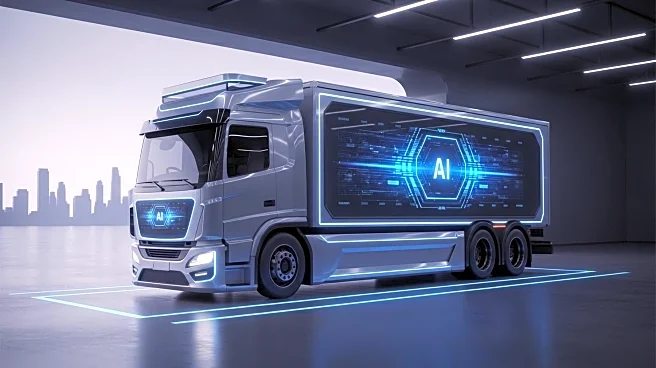What's Happening?
FleetWorks, a company founded by Paul Singer, a former product manager at Uber Freight, has raised $17 million to advance its AI-driven marketplace designed to streamline cargo matching for trucking companies. The funding includes a $15 million Series A round led by First Round Capital, with participation from Y Combinator, Saga Ventures, and LFX Venture Partners. FleetWorks aims to modernize the traditional methods used by small trucking companies by leveraging artificial intelligence to facilitate faster and more efficient matches between carriers and goods. The company has already onboarded over 10,000 carriers and numerous brokers, including Uber Freight, onto its platform. The funds will be used for hiring, commercial expansion, and product development, including the launch of an 'always-on' AI dispatcher.
Why It's Important?
The investment in FleetWorks highlights the growing importance of artificial intelligence in the logistics and transportation industry. By improving the efficiency of cargo matching, FleetWorks can significantly reduce the time and resources required for small carrier fleets, which constitute the majority of the industry. This development could lead to cost savings and increased profitability for these companies. Additionally, the use of AI in logistics can enhance communication and decision-making processes, potentially transforming the industry by making it more responsive and adaptable to changing conditions. The involvement of prominent investors like First Round Capital underscores the potential impact of AI-driven solutions in revolutionizing traditional business models.
What's Next?
FleetWorks plans to use the newly acquired funds to expand its operations and further develop its AI technology. The company will focus on hiring additional staff and enhancing its product offerings to better serve its growing customer base. As FleetWorks continues to refine its AI models, it may attract more carriers and brokers to its platform, increasing its market share. The success of FleetWorks could prompt other companies in the logistics sector to adopt similar AI-driven solutions, potentially leading to widespread changes in how cargo is matched and transported across the United States.
Beyond the Headlines
The integration of AI into logistics not only promises operational efficiencies but also raises questions about the future of employment in the industry. As AI takes on more roles traditionally handled by humans, there may be shifts in job requirements and opportunities. Additionally, the reliance on AI for decision-making processes necessitates robust data management and security measures to prevent errors and ensure reliability. The ethical implications of AI-driven logistics, such as privacy concerns and the potential for bias in algorithmic decision-making, will need to be addressed as the technology becomes more prevalent.










